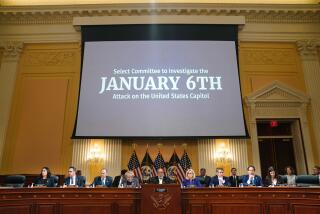Toward Censure--Quickly
- Share via
The 13 House Republicans who will serve as prosecutors in President Clinton’s impeachment trial before the Senate are talking about calling as many as 15 witnesses to support allegations that Clinton lied to a grand jury about his sexual relationship with Monica Lewinsky and then obstructed justice by trying to cover up the affair. Senate Majority Leader Trent Lott (R-Miss.) has a far more sensible idea. He favors a short trial, conducted without witnesses who would be likely to add little to the sordid record long since placed before the country. That is the procedure the Senate should follow.
House Republicans argue that unless Clinton admits to wrongdoing, witnesses will be needed to bolster the allegations on which the articles of impeachment voted by the House are based. On a possible witness list are Lewinsky; Betty Currie, the president’s secretary; and Vernon Jordan, a Clinton confidant.
But if witnesses are essential to nail down the case against Clinton, why weren’t they called during the House Judiciary Committee’s hearings? Both sides had the opportunity to solicit testimony to support or undercut the case against Clinton. Neither did so. Instead they invited panels of lawyers and historians to talk about what constitutes perjury, and what the Constitution’s framers had in mind when they wrote that impeachment must be warranted by “high crimes and misdemeanors.” None of this directly addressed the substance of the charges against Clinton.
Lott’s tentative plan is to open the impeachment trial Jan. 7, one day after the Senate convenes. What happens next is conjectural. The House prosecutors, who will include Rep. James E. Rogan (R-Glendale) could start to present their case immediately. Or there could be a pause of some weeks so the White House could work on its defense. It’s also possible that the trial could be abruptly suspended, on a motion supported by a simple majority of senators.
What just about everyone does agree on is that the votes to convict Clinton--67 are needed--won’t be there, either on the first day of the trial or the last.
Lott indicates that he nonetheless wants the trial to go to a vote and then, assuming that Clinton is acquitted, the Senate could consider a resolution of censure. But this reasoning doesn’t track. Censure would mean something only if Clinton agrees to accept it; otherwise, it is a largely empty expression of opinion. Once acquitted, any incentive he had to accept the opprobrium and humiliation of a formal condemnation would disappear.
Clinton merits censure in the strongest terms for the disgrace he brought on his office. But the likely result of voting in the Senate makes it plain that the terms of censure had better be negotiated before a vote to convict or acquit. Afterward will be too late.
A protracted impeachment trial in any event is not in the nation’s interest. The proper alternative is a harsh resolution of censure, with Clinton agreeing to take responsibility for his misdeeds. But that deal had better be negotiated quickly, before an acquittal by the Senate makes the option moot.
More to Read
Get the L.A. Times Politics newsletter
Deeply reported insights into legislation, politics and policy from Sacramento, Washington and beyond. In your inbox twice per week.
You may occasionally receive promotional content from the Los Angeles Times.










